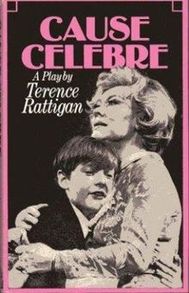
Cause Célèbre, Terence Rattigan’s last play, explores an infamous crime which took place in an outwardly respectable house in Bournemouth in 1934.
It is clear (both in the play and from true-crime accounts) that Francis Rattenbury has been living a sexless marriage with Alma for years; he is more enamored of his liquor cabinet than his younger wife. Further, he says nothing about the obvious physical relationship between Alma and George, turning a blind eye to the matter and retiring to his own bedroom when not passing out in the study after too many drinks. A fit of jealousy strikes the teenage Wood when he realizes he will always be consigned to servant status, and one March night fatally batters husband “Ratz” with a mallet borrowed from his grandparent.
The trial hopes to answer the obvious and important questions: how much influence did Alma Rattenbury have over George Wood, and how involved was she in her husband’s murder? To prosecution and, likely, the play’s audience, it seems obvious at first: a woman who ensnares a teen lover and carries on so that everyone in the house knows her actions is a Sinful Soul, flying in the face of propriety and Christian morals, and deserving of the judgement society will attach. But playwright Rattigan pushes further, hinting that the power dynamics might not be so simple.
Indeed, in Cause Célèbre Terence Rattigan does what all good dramatists try to do: he uses a story – here, one about a sordid domestic murder – to say something greater about humanity, calling out and questioning conventional wisdom in the process. Alma Rattenbury’s trial shares stage space with the personal problems of Edith Davenport, a woman navigating a painful divorce and watching her own teen son, Tony, reject her as he makes disastrous choices in the name of independence. It’s an intriguing mirror image, and it is Edith, as the jury forewoman, who finds the surprising empathy to understand that women who society reflexively sees as manipulating younger men are actually being manipulated in turn.
I found the contrast between the frankly presented subject matter of the play and the moral perspective of 1930s bourgeois society quite fascinating. Rattigan is never prurient, nor is he truly explicit the way we find true-crime sordidness today, but his script doesn’t shy away from the unavoidable elements of sexuality and power dynamics that led to murder. There is a chilling scene where desires collide as George Wood strips off his clothes to climb into Alma’s bed, only to confess to killing her husband downstairs moments before.
Cause Célèbre is not a perfect play, but it is skillfully constructed and a fitting final bow from a British playwright who, both here and in stage stories like The Winslow Boy (1946) and The Deep Blue Sea (1952), explored the damage that (often hypocritical) public moral sentiment could inflict on flawed individuals. It is also my second entry for the Crimes of the Century review challenge, which this month focuses on 1977: Cause Célèbre débuted at Her Majesty’s Theatre in London on July 4th of that year.
 RSS Feed
RSS Feed